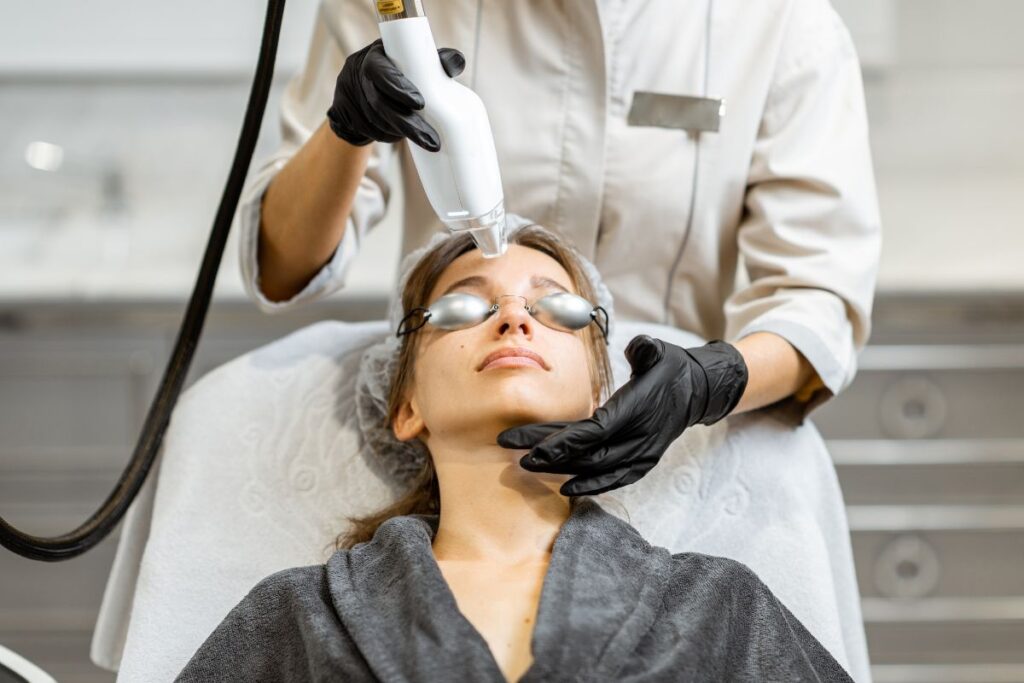Thinking about getting laser therapy for your skin? Wondering if it’s safe or if it could cause long-term damage? Here’s everything you need to know about laser treatments, including potential side effects and why it’s essential to see a qualified dermatologist.
What is Laser Skin Therapy?
Focused light is used in laser skin therapy to treat various concerns of skin, including acne, hyperpigmentation, wrinkles, and scars. To remove damaged skin or encourage the production of collagen for smoother, younger-looking skin, a laser device is used to target particular skin layers.
How Does Laser Therapy Work?
Laser skin therapy can work in different ways depending on the type of laser used:
1. Ablative Lasers:
These lasers remove damaged skin layers and are used for deep wrinkles, scarring, and skin resurfacing.
2. Non-Ablative Lasers:
Used to treat mild wrinkles, sun damage, and pigmentation problems, these lasers encourage the formation of collagen in the lowermost layers of the skin.
3. Fractional Lasers:
A combination of both, these lasers treat only specific parts of the skin; as a result, healing is quick, and discomfort is minimal.
Potential Side Effects of Laser Skin Therapy:
1. Redness and Swelling:
Some redness and swelling are expected immediately after treatment, but it usually subsides within a few days.
2. Scarring:
If not done properly or if you have sensitive skin, there’s a risk of scarring, particularly with ablative lasers.
3. Hyperpigmentation or Hypopigmentation:
Changes in skin tone, where the skin becomes either darker (hyperpigmentation) or lighter (hypopigmentation).
4. Infection:
Although rare, infection can occur if the skin is not properly cared for after the procedure.
5. Burns:
If done by an untrained professional, laser therapy could lead to burns or blistering.
Why Should You Only Consult a Dermatologist for Laser Therapy?
Laser therapy is an advanced treatment that requires a trained professional to ensure safety and effectiveness. Consulting a qualified dermatologist ensures the following:
● Personalized Treatment: Your skin type will be evaluated by the dermatologist, who will also recommend the laser therapy that is most suited to your needs.
● Avoiding Side Effects: A dermatologist can minimize the risk of adverse effects by using the right laser for your skin and ensuring the proper technique.
● Post-treatment care: Proper aftercare will be necessary
● cfdcxto avoid complications.
Frequently Asked Questions
Are laser treatments safe for all skin types?
No, not all lasers are suitable for every skin type. A dermatologist will determine the safest treatment for your skin type.
How many sessions do I need for effective results?
Usually, 3-5 sessions are required to see full results, depending on the condition being treated.
Can laser therapy treat acne scars?
Yes, fractional lasers and ablative lasers can treat acne scars and improve skin texture.
How HealthPil Can Help:
At HealthPil, we connect you with experienced dermatologists who specialize in laser skin therapy. Whether you’re looking to treat wrinkles, acne scars, or hyperpigmentation, our experts provide safe and effective treatments tailored to your skin type.
Disclaimer:
This article is for informational purposes only. Always consult a qualified healthcare provider for proper diagnosis and treatment of skin conditions with laser therapy.

